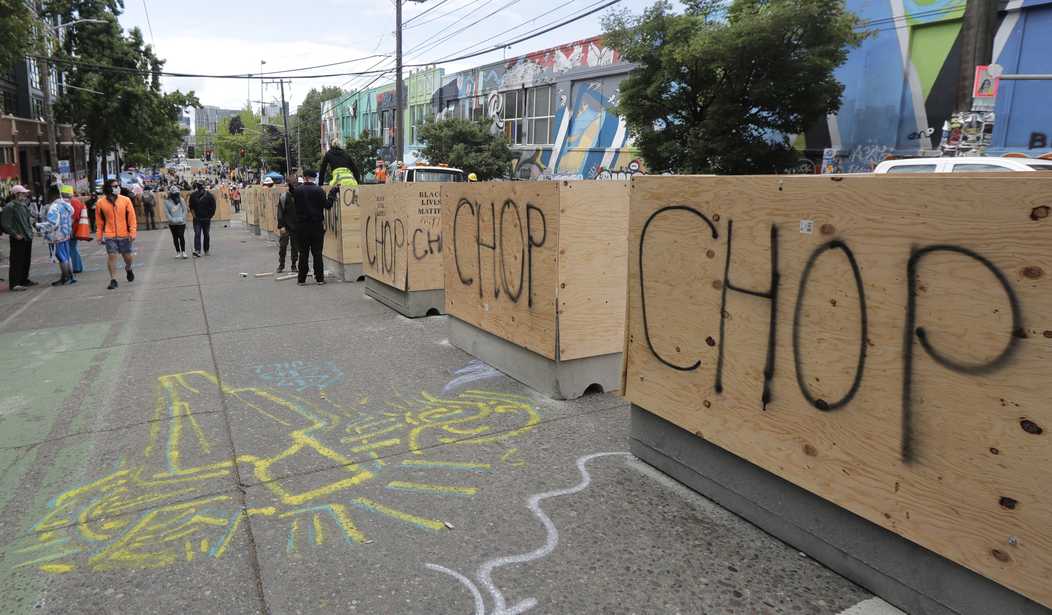One facet of the racial and social tensions besetting our countries is the emergence of small anarchist enclaves setting up so-called “autonomous zones” in the midst of our cities. Seattle’s CHAZ/CHOP is the most notorious of these new presumably decentralized “republics.” Other cities are preparing for and perhaps welcoming the invasion. These political theaters are, in their way, an updating of the hippie communes of the Sixties and the ensuing decades—none of which worked—while bearing a family resemblance to the “no-go” zones proliferating in France and Sweden.
Hybrid phenomena, they pursue an agenda that obviously has no future, vitiated by internal contradictions that escape their blinkered founders as they do the media and their political enablers. “Summers of love,” “block parties,” social experiments in egalitarian governance, political and cultural alternatives to mainstream “liberal democracy” and capitalist, free-market societies, they are frankly unsustainable.
The reason for their lack of viability is that they are by nature unproductive. That few people seem to have recognized the fact is remarkable. Such quasi-political units can exist only parasitically on the charity, forbearance, and timorousness of the surrounding society they have rejected and regard as an enemy to be resisted or defeated. They are unable to generate wealth and do not—cannot—produce anything of value even to satisfy their own wants. They are economic vacuums, takers, not makers. And when there is nothing more to take, they must necessarily implode.
They have no farming apart from patches of scrannel and no reliable agricultural expertise and therefore cannot nourish themselves. They have no manufacturing and therefore cannot build an environing infrastructure. They have no technology and therefore cannot invent means of communication, transportation, domestic appliances, pharmaceuticals, medicines, vaccines, and so on. They have no textile industries and therefore cannot clothe themselves. They have no plumbing equipment, fixtures, and installations and therefore cannot provide for their own health. They have no hospitals and therefore cannot care for the sick.
Is Seattle Reliving the Paris Commune?
Further, they must rely on imports from outside, but cannot pay for them with exports, cash, or service-on-demand. They have no currency apart from methods of primitive barter. Even the little things they have always taken for granted—toothpaste, toilet paper, t-shirts, shoes, coffee, and a thousand other domestic items—lie beyond their ability to provide. They are barren colonies with no idea how to persist, let alone flourish, on their own terms. They are leeches and sycophants on the outside world but refuse any form of symbiosis. In short, they constitute a dead end.
Contradictions continue to abound. They do not believe in national borders but erect their own defensive barricades. They believe in establishing a neighborhood without police but soon create their own enforcement apparatus and have been unable to prevent eruptions of violence. They swear by the abolition of class and caste but find that command structures inevitably assert themselves. Whatever goods they have brought with them into their impecunious utopia are soon distributed upwards to those who have claimed and defended their own authority.
In other words, these microdots are defined by the twin attributes of ignorance and hypocrisy and are wholly dependent on the world they have rejected. Left to themselves they will collapse and die. A community that does not till, mine, invent, build, and trade must wither on the vine. A society of whatever magnitude that is inherently unproductive cannot survive without continual infusions from beyond its boundaries or, as history has amply demonstrated, by raids of aggression against “the other.”
But these anarchist parishes are not without value, as they furnish a microcosm of what a socialist government and administration would create on a national scale: scarcity, dysfunction, rigid hierarchy, coercion, and widespread misery—in other words, an endemically poor, uncreative, and autocratic society of disempowered subservients. Of course, socialist nations are not minuscule domains of disgruntled adolescents, social misfits, and wannabe anarchists protesting they know not what and playing to the crowd. Rather, they function on the macro level, are deadly serious, control large territories, are capable of political organization, and are predicated on a sustainable basis, however temporary. The key is that they cannot survive or flourish indefinitely without accommodation to the world beyond their borders—and in many cases, as Maggie Thatcher brilliantly put it, they will last only until they run out of other people’s money.
But the soi-disant “autonomous zones” present a kind of blueprint, a mise en abyme or political fractal of what to expect should they expand into national entities. The prognosis is poor. When the little Quaker Oats box becomes the big Quaker Oats box, people start to grow hungry. What is surely most alarming is that the lesson seems never to be learned. The collective imbecility is staggering as the children and their child-adult mentors continue marching toward ideological perdition.
————————
David Solway’s latest book is Notes from a Derelict Culture, Black House Publishing, 2019, London. A CD of his original songs, Partial to Cain, appeared in 2019.










Join the conversation as a VIP Member